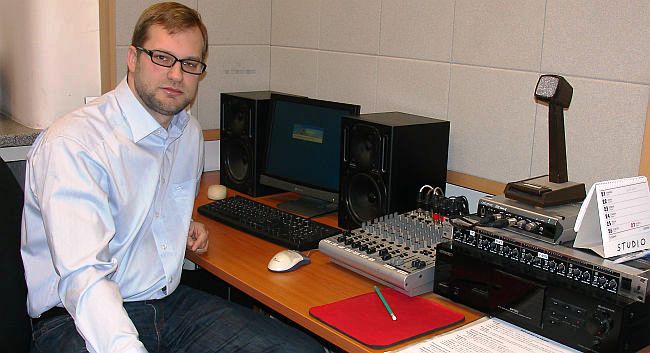Lucie Kettnerová • foto: red. • 4 March 2013
Forensic phonetics uses voice to identify criminals
Is the accused person identical to the anonymous caller on the audio recording? A forensic phonetician might help crime investigators reveal the truth; unfortunately, very few experts have such a specialization in this country. Therefore, the Institute of Phonetics, CU FA, has now launched, for the first time, a seminar of forensic phonetics, with an ambition to satisfy the demand for such specialists. Doc. Mgr. Radek Skarnitzl, Ph.D. is the instructor.

Ředitel Fonetického ústavu FF UK doc. Mgr. Radek Skarnitzl, Ph.D.
What made you include a course in forensic phonetics in your degree programme?
The seminar responded to interest among our students as well as experts because in the Czech Republic forensic phonetics has as yet received very little attention at specialist level. The Institute of Criminalistics Prague has a department of audio-video and documentation; Jan Mládek, who used to be the only expert on voice analysis in the police ranks, left this institution two years ago. The position remained vacant for a long time; it was only recently that captain Luboš Voříšek joined the department. Mr. Voříšek, however, is an engineer not a phonetician; voice comparison requires a knowledge of phonetics and linguistics: for instance, knowing the limitations of voice variability in a speaker. Therefore, he has joined our courses and is one of the participants in the forensic phonetics seminar.
Our graduate, PhDr. Marie Svobodová, Ph.D., is the only Czech phonetician who actually makes a living by forensic phonetics, and she was happy to take the opportunity to broaden her knowledge to include theory and statistical analyses. Just how big the market currently is for experts is unclear. We know, however, that we are the only institution in the country to offer a degree programme in phonetics and a seminar in forensic phonetics.
Who is the primary target group of the seminar?
First and foremost, the seminar is an optional course for students in the follow-up MA programme in phonetics. We are a small programme, with eight students in the MA programme. The seminar participants currently include three of our students in addition to Marie Svobodová and Luboš Voříšek.
At the same time, provided there is interest among members of the Police Academy or other expert groups and institutions, we are ready to offer lifelong-learning seminars in forensic phonetics as well as more complex education programmes in the basics of acoustics, physiological phonetics and so on. These could be four-hour blocks with the teaching participation of other colleagues of the Institute of Phonetics.
Will the seminar become a regular part of the curriculum?
Normally, optional subjects are offered once every two years, for capacity reasons. In this particular case, we would like to repeat the course in the following year to let it “take roots”, although I cannot promise it now.
What will the course contain and what will be the theory-practice ratio?
The course will be equally balanced between theory and practice. The introductory lessons will include the history of speech identification: for instance, when was voice first used to identify offenders; later we will discuss the roles and potentials of forensic phonetics or the physiology of voice with its unique nature and variability. The major part of the course concentrates on the perceptive-auditory approach and the instrumental – or acoustic – approach to speaker identification. We will discuss all the things that voice reveals about speakers, such as their sex, age, region, socioeconomic class or education. The following lessons will draw on this theory by measuring various acoustic parameters such as basic voice frequency and formants.
The end of the semester will focus on statistical evaluation; we will use several voice features available to identify the probability that they belong to two speakers or one. The very last short chapter will deal with ethics. Each year we would like to conduct a short research project focusing on the effectiveness that a given feature has for distinguishing speakers.
|
Would you find forensic phonetics useful in your profession and would you like to expand your expertise? Please contact Radek Skarnitzl at . With a sufficient number of applicants, a special programme may be offered under lifelong education. The seminar has been supported by the Higher Education Development Fund project FRVŠ 193/2012. |
